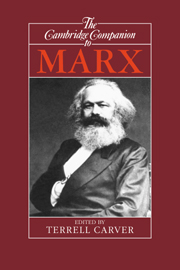12 - History of philosophy
The metaphysics of substance in Marx
Published online by Cambridge University Press: 28 May 2006
Summary
The primary tradition in European philosophy since antiquity has been Aristotelianism. Most philosophers have worked within some version of it, and it would be no more exaggerated than most slogans to say that philosophy has been a series of footnotes to Aristotle and in particular to his metaphysical doctrine of substance. The tradition is not an unchanging monolith, of course, but a diversity with a unity and continuity given by shared metaphysical principles. It runs from Aristotle and the Peripatetics through the Arabs, Al Farabi, and Averroes, to St. Thomas Aquinas and the medieval philosophers, and on to Baruch Spinoza, Gottfried Leibniz, G. W. F. Hegel, and Marx.
Marx was an Aristotelian in metaphysics, and unless we keep this in mind we cannot appreciate his work. This has been lost sight of since Marx's time because scholarship and thought in this century, especially in English-speaking countries, have been deeply affected by the legacy of the empiricist philosophers, especially David Hume. For several decades it was de rigeur to reinterpret writers of the older tradition according to the principles of empiricist metaphysics. Aristotle and Marx are only two of the more prominent authors to have received such treatment, and to understand them it is necessary to stand back from much of the recent writing.
- Type
- Chapter
- Information
- The Cambridge Companion to Marx , pp. 296 - 319Publisher: Cambridge University PressPrint publication year: 1991
- 4
- Cited by

